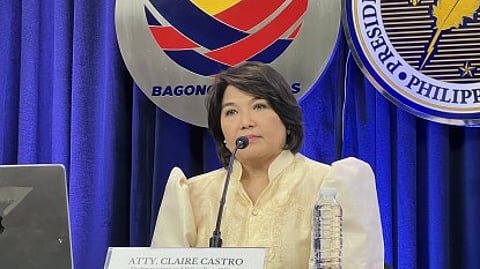
- NEWS
- the EDIT
- COMMENTARY
- BUSINESS
- LIFE
- SHOW
- ACTION
- GLOBAL GOALS
- SNAPS
- DYARYO TIRADA
- MORE

A labor group on Thursday called out Palace Press Officer Claire Castro for being "misinformed" after she claimed that President Ferdinand Marcos Jr. had nothing to do with the clamor for a wage hike amid calls for him to order Congress to swiftly pass the corresponding bill for the increase.
Castro made the statement on Wednesday in response to the Trade Union Congress of the Philippines (TUCP)’s petition to Marcos to certify a bill proposing a P200 legislated across-the-board wage increase, which has languished in Congress for years.
The Malacañang official said Marcos only adheres to the Regional Tripartite Wages and Productivity Boards (RTWPBs) in assessing whether employee salaries must be reviewed, although she noted that at least 16 regions so far have been evaluating the calls for a wage hike.
Disputing Castro, the TUCP asserted that Marcos could act if he wanted to.
“The TUCP strongly reminds the good undersecretary that the President has the power to act — and we trust that the President will. Section 26, Article VI of the 1987 Constitution empowers the President to certify as urgent any bill ‘to meet a public calamity or emergency,’” the group stressed, citing the persistently high cost of transportation and basic services.
“Enough with the misdirection and misinformation. Workers have been at the forefront of every sacrifice, and workers now look to President Marcos to immediately certify the legislated wage hike as urgent," the federation added.
In February last year, the Senate passed a bill increasing the minimum wage of workers in the private sector nationwide by P100. One year later, the House of Representatives passed its counterpart measure on the second reading, though that proposal was P100 higher than the Senate’s.
Senate President Francis Escudero has already committed that they will make amends with the House leadership.
However, when Congress resumes session in June, only six session days will remain to pass the needed bill, narrowing the chances of the measure becoming law.
The TUCP underscored the need for Marcos to certify the bill as urgent, enabling the House and the Senate to iron out the disagreeing provisions of their respective bills and ratify it before the 19th Congress ends on 13 June.
To recall, the last wage increase was more than three decades ago when Congress enacted the Wage Rationalization Act of 1989 (Republic Act 6727), the law that established RTWPBs.
Efforts to secure another salary increase have been made consistently for years, but all were unsuccessful due to various factors, with concerns mainly from business sectors, which are said to be most affected.
According to Deputy Speaker and TUCP Representative Raymond Democrito Mendoza, despite the enactment of the law, which he said increased the minimum wage by 40 percent, there was no massive inflation, wave of unemployment, or collapse of businesses.
Marcos himself has expressed reservations about the proposed wage hike, citing the need for a thorough review.
The Employers Confederation of the Philippines (ECOP), the country's biggest trade organization, has consistently rejected calls for the wage hike, citing its disadvantage for MSMEs, which it claimed will be severely affected by the increase but won't get anything in return.
Further, the ECOP asserted that the proposed wage hike will also hit farmers, fisherfolk, market vendors and some in the informal sector, which accounts for 84 percent of the labor force.
Some employer groups have also opposed the calls for legislated wage hikes for fear that it may lead to layoffs or force small businesses to shut down.
